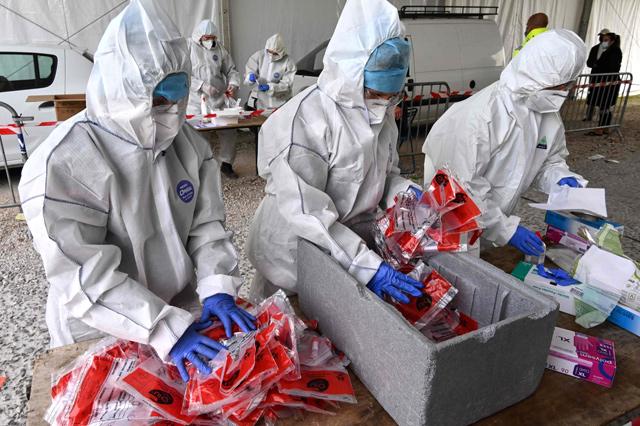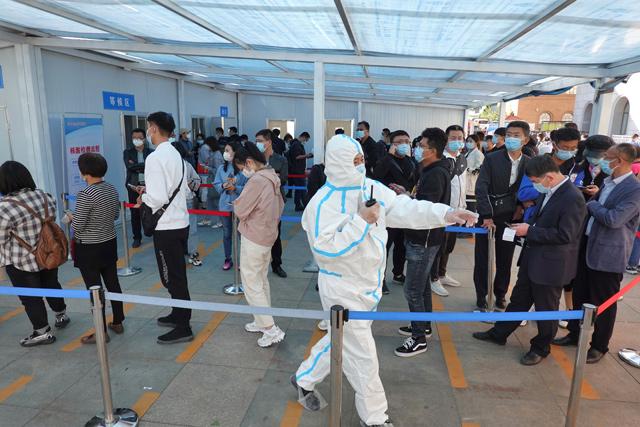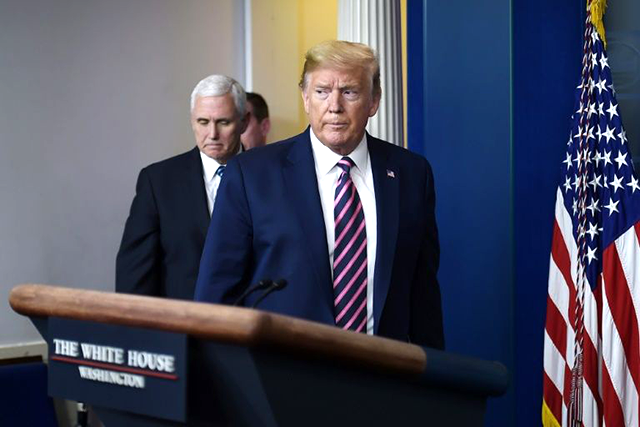You are here
New lockdowns from China to Europe as virus trials stumble
By AFP - Oct 14,2020 - Last updated at Oct 14,2020

Firefighters wearing protective suits handle tests carried out at a drive-through COVID-19 screening on Wednesday in Montpellier (AFP photo)
PARIS — As Europe imposed new restrictions to try to stall a surging second wave of the novel coronavirus, hopes for vaccines to rapidly provide relief suffered a blow Tuesday with the suspension of two clinical trials in the United States.
China, meanwhile, rushed to test an entire city of nine million within days after a minor coronavirus outbreak in the sprawling country, and Europe struggled to tackle a new surge of infections.
The virus is still spreading rapidly worldwide, with over one million deaths and 37 million infections. Many nations that suppressed their first outbreaks now face a second wave.
Hopes for a rapid vaccine rollout suffered a setback as US pharmaceutical firm Eli Lilly said it had suspended the Phase 3 trial of its antibody treatment over an unspecified incident, the second in less than 24 hours after Johnson & Johnson ran into a similar problem.
In Europe, the Netherlands imposed a "partial lockdown" to curb one of the region's worst coronavirus surges, with all bars, cafes and restaurants to close, and non-medical face coverings mandatory in all indoor spaces for people aged over 13.
In Britain, Labour opposition leader Keir Starmer called for a 2-3 week "circuit break" lockdown to slow the rates, saying the government had "lost control" of the outbreak having ignored stringent measures suggested by scientific experts on September 21.
French President Emmanuel Macron is expected to announce tighter restrictions and faster testing in a prime-time TV interview late Wednesday, with some media speculating Paris and other cities could face evening curfews.
Meanwhile China — where COVID-19 first emerged late last year — launched a drive to test all residents of Qingdao after a handful of cases were detected on Sunday.
More than four million samples had been collected and 1.9 million results returned as of Tuesday afternoon, Qingdao authorities said, adding that no new cases had been found beyond already confirmed infections.
Chinese officials intend to test the entire city — around 9.4 million people — by Thursday.
In scenes contrasting with the fumbled testing efforts elsewhere, health workers in protective clothing swiftly set up tents and residents queued up to provide samples.
As the rest of Europe struggled to contain the disease, Russia also reported its highest-ever number of daily virus deaths, at 244, and a record number of new cases at almost 14,000.
Italy imposed new, tougher rules to control a resurgence, including an end to parties, amateur football matches and snacking at bars at night.
Polish Prime Minister Mateusz Morawiecki became the latest high-profile figure to go into quarantine after coming into contact with an infected person.
And Portugal’s football federation said star striker Cristiano Ronaldo had tested positive for the virus.
‘Ethically problematic’
In opposition to lockdowns and social distancing, some politicians have proposed letting the coronavirus circulate in the population to build up “herd immunity” — where so much of the population has been infected there are insufficient new victims for the virus to jump to.
But the World Health Organisation has dismissed such plans as “ethically problematic” and requiring mass vaccinations to work.
Furthermore, study published in The Lancet Infectious Diseases journal indicated that exposure to the virus may not guarantee future immunity — and the second infection could come with even more severe symptoms.
$12 billion for developing world
Despite the vaccine testing setbacks, which health experts say is normal as testing scales up massively in its later stages, the World Bank approved $12 billion for developing countries to finance the purchase and distribution of vaccines, tests and treatment.
The financing “aims to support vaccination of up to a billion people,” the bank said.
The announcement came as Oxfam warned of “COVID famines” in the wake of the pandemic and said the international community’s response to global food insecurity was “dangerously inadequate”.
For its part, the International Monetary Fund said that while the recession triggered by the pandemic was less severe than initially feared, the global GDP will still contract 4.4 per cent.
“The ascent out of this calamity is likely to be long, uneven, and highly uncertain,” IMF Chief Economist Gita Gopinath said.
In the United States, President Donald Trump has returned to the campaign trail three weeks before the November 3 election, after being hospitalised with COVID-19. He held a new rally with supporters in the battleground state of Pennsylvanian late Tuesday.
Critics have excoriated Trump for his handling of the crisis, with more known infections and deaths in the United States than anywhere else in the world.
But Trump has been touting his own swift recovery, after being treated with experimental therapeutics at Walter Reed military hospital close to Washington, DC, as a rallying cry to re-open the country.
“I went through it and now they say I’m immune... I feel so powerful,” Trump told a cheering crowd in Florida on Monday, few of whom wore masks.
Environment
Pandemic restrictions saw an unprecedented fall in greenhouse gas emissions in the first half of 2020 — larger than during the 2008 financial crisis and even World War II — experts said Wednesday.
As governments ordered lockdowns to try to crush the first wave of COVID-19, CO2 emissions from transport, power and aviation plummeted, the international team of researchers said.
Using data including hourly electricity production, vehicle traffic from more than 400 cities worldwide, daily passenger flights and monthly production and consumption figures, they determined that the emissions drop was the largest in modern history.
They suggested some fundamental steps that could be taken to “stabilise the global climate” as countries look to recover from the economic shock of the pandemic.
They noted however that emissions had rebounded to their usual levels by July 2020, when most nations had eased lockdown measures.
Zhu Liu from the Department of Earth System Science at Tsinghua University in Beijing said the study was the most accurate yet undertaken on the pandemic’s effect on emissions.
“We were able to get a much faster and more accurate overview, including timelines that show how emissions decreases have corresponded to lockdown measures in each country,” said Zhu, lead author of the study published in Nature Communications.
The team found that CO2 emissions from transport decreased by 40 per cent in the first half of 2020, and power production and industry emissions fell 22 per cent and 17 per cent respectively.
With more people working from home, the study showed a perhaps surprising 3 per cent fall in residential emissions — something researchers attributed to an abnormally warm winter leading to lower heating consumption.
Related Articles
BEIJING — China rushed to test an entire city of nine million people within days on Tuesday after a minor coronavirus outbreak, underlining
BEIJING — All nine million people in a major Chinese port city will be tested for COVID-19 following a tiny outbreak, health officials said
PARIS — The World Health Organisation(WHO) warned on Saturday recovering from coronavirus may not protect people from reinfection as the dea



















